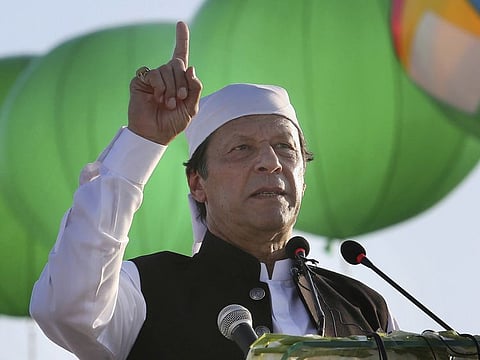Pakistan’s political class must get its act together
Imran Khan’s promise of change still remains an unfulfilled dream

Last week’s departure of Pakistan’s former prime minister Nawaz Sharif for medical treatment to the United Kingdom has temporarily halted mounting uncertainty surrounding Sharif’s fate.
And yet, Pakistan’s ruling parties led by Prime Minister Imran Khan and their opponents like Sharif’s Pakistan Muslim League-Nawaz (PML-N) and former president Asif Zardari’s Pakistan People’s Party (PPP), all appear to have effectively lost the plot.
As vicious verbal attacks and counter-attacks mount across Pakistan’s political landscape, the rulers and the opposition are increasingly failing to keep abreast of the country’s grass roots. In brief, the mother of all disconnects as witnessed increasingly across Pakistan have few parallels in the country’s 72 year history.
Never before has the South Asian country witnessed a similar breakdown of leadership — government and opposition alike — when judged in view of the connection between one party or the other to ordinary Pakistanis. It is therefore not surprising that the country’s mainstream constituents appear to be at a loss when confronted with the obvious question — exactly who is best qualified to lead them to a more promising future.
Unless Pakistan’s ruling politicians led by Imran Khan return to the drawing board and carve out a formula for urgent action in the coming months, its possible that their ability to take charge in future will be severely compromised.Farhan Bokhari, Pakistan commentator
For politicians loyal to Imran, Sharif’s illness that eventually drove him overseas, seemed more like a staged affair than a real life calamity and potentially life threatening. In contrast opposition leaders denounced Imran for ignoring the former prime minister’s life sliding condition.
But with this sorry saga now over, Imran and his Pakistan Tehreek-e-Insaf (PTI) party must face the compelling and considerably long list of challenges across the country’s grass roots. More than a year after the PTI began its maiden five-year tenure, for five years, the party appears to be rudderless and possibly even directionless.
An the joke these days is on none other than Abdul Hafeez Shaikh, the de facto finance minister, after he publicly claimed that a kilo of tomatoes were selling at Rs17 — a figure in reality at a 10th or 15th of the market price. That must qualify as a faux pax with few parallels in Pakistan’s history.
Meanwhile, in the past week, the government allowed a nominal increase in the price of wheat given for purchase from farmers across Pakistan, only to leave many rural dwellers clearly short changed. The rise came more than five years after the last rise and is broadly way below the rise in production costs for farmers.
Crisis of governance
To make matters worse, Imran’s government is increasingly targeted at the popular level for disappointing Pakistanis on many fronts. An acute crisis of governance that has increasingly engulfed Pakistan so far shows few signs of ending any time soon, notwithstanding Imran’s own promises of overseeing reforms leading to progressive change within the first 100 days of his rule.
Meanwhile, across business circles in Pakistan, there are few signs of returning confidence irrespective of official claims. A recent report by the World Bank concluded that Pakistan had improved its standing on an ‘ease of doing’ business matrix. Yet, individual businessmen including some of the best placed ones cite accounts of disincentives that often discourage their plans.
But if Imran’s government is disappointing Pakistanis, the same must apply to the opposition parties as well. Obsessed with getting their respective leaders off the hook on corruption charges, opposition parties have shown little inclination to either take on the government on its flawed policies or suggest alternatives to bring the country out of the current mess. The reality on this front appears to be more by way of opposition parties taking on the ruling structure on mundane matters.
Its therefore hardly surprising that Imran and his team anecdotally appear to be at the centre of mounting public scepticism over their ability to reset Pakistan’s direction for a more promising future. And for the fact that the current public disquiet has not translated into an outright mass backlash against the federal government, Imran and the politicians from the ruling PTI must thank the opposition parties!
Also Read: The contrasting faces of Pakistan
Also Read: Pakistan’s ruling structure needs to refocus
In previous years, the PML-N and PPP have both ruled Pakistan, only to leave behind a dismal legacy with quality of life for ordinary citizens only in decline. But this cannot be a reason for Pakistan’s present-day rulers driven by a very obvious sense of complacency, to continue with the present-day status quo. In reality, the status quo is in fact surrounded by a continuing decline, visibly observed with the decline of Pakistan’s institutions and structures of government in key areas. If indeed Imran and his team were even to come up with flawless policies, their ability to translate them in real-life action will remain in doubt.
Going forward, the bottom line for now is just one — Imran’s promise of tabdeeli or change which underlined his election as prime minister in 2018, remains an unfulfilled dream. Though the next parliamentary elections are not due till the second half of 2023, there is a palpable sense of drift that surrounds Pakistan today.
Unless Pakistan’s ruling politicians led by Imran return to the drawing board and carve out a formula for urgent action in the coming months, its possible that their ability to take charge in future will be severely compromised. Eventually, the ruling structure may just be left with fighting fires and reacting to mounting challenges rather than taking charge of Pakistan when they still can.
— Farhan Bokhari is a Pakistan-based commentator who writes on political and economic matters.



